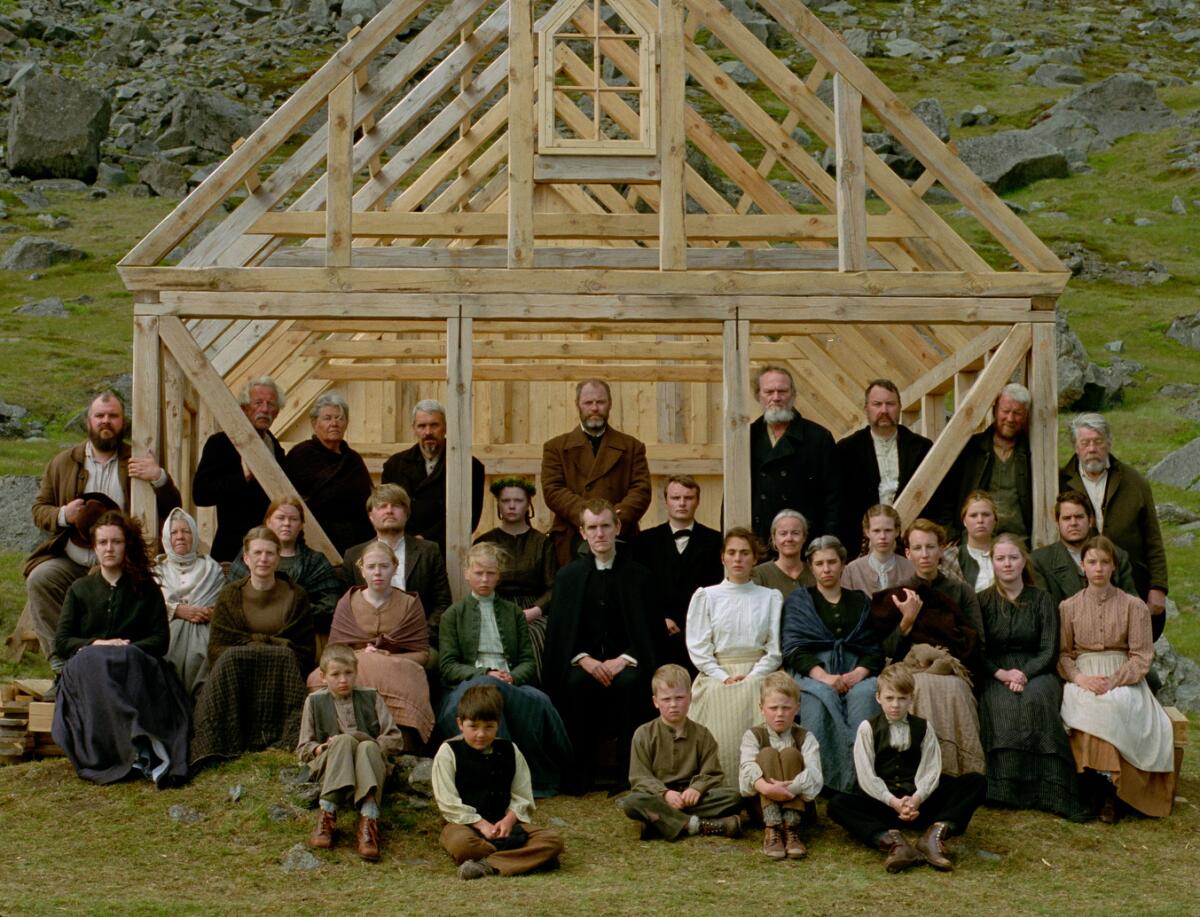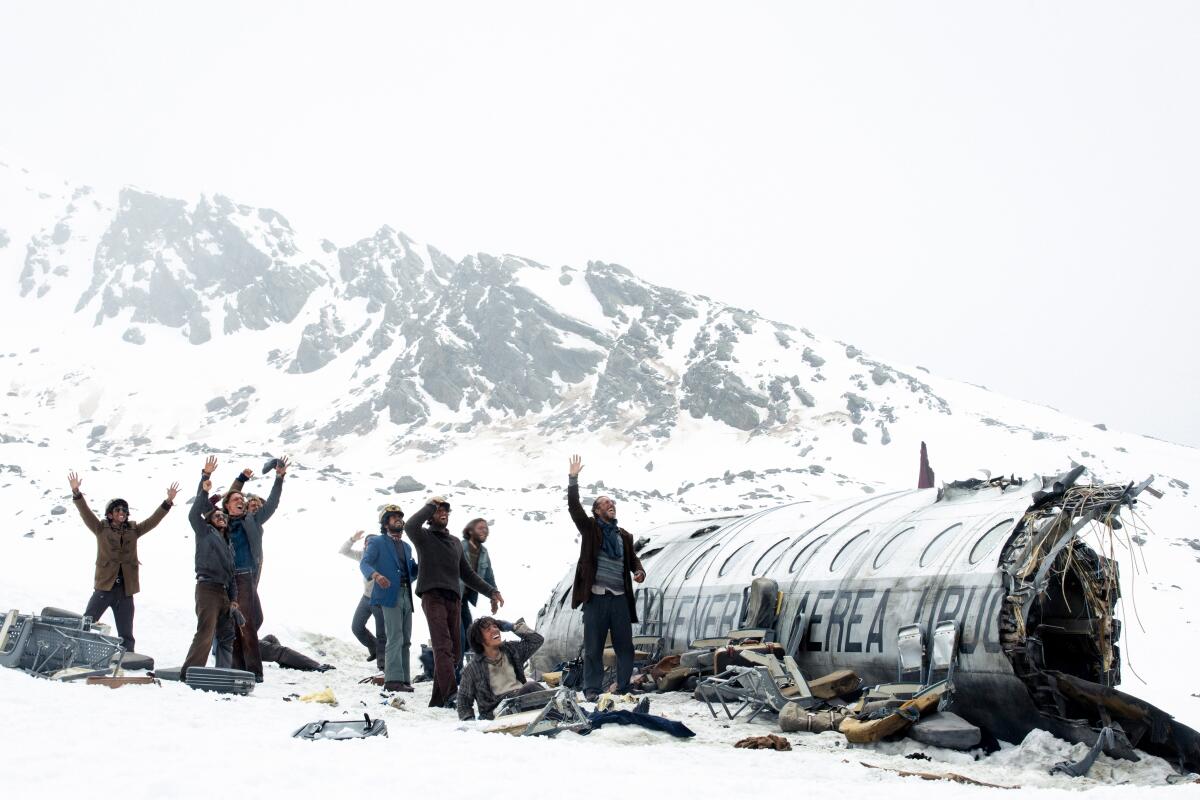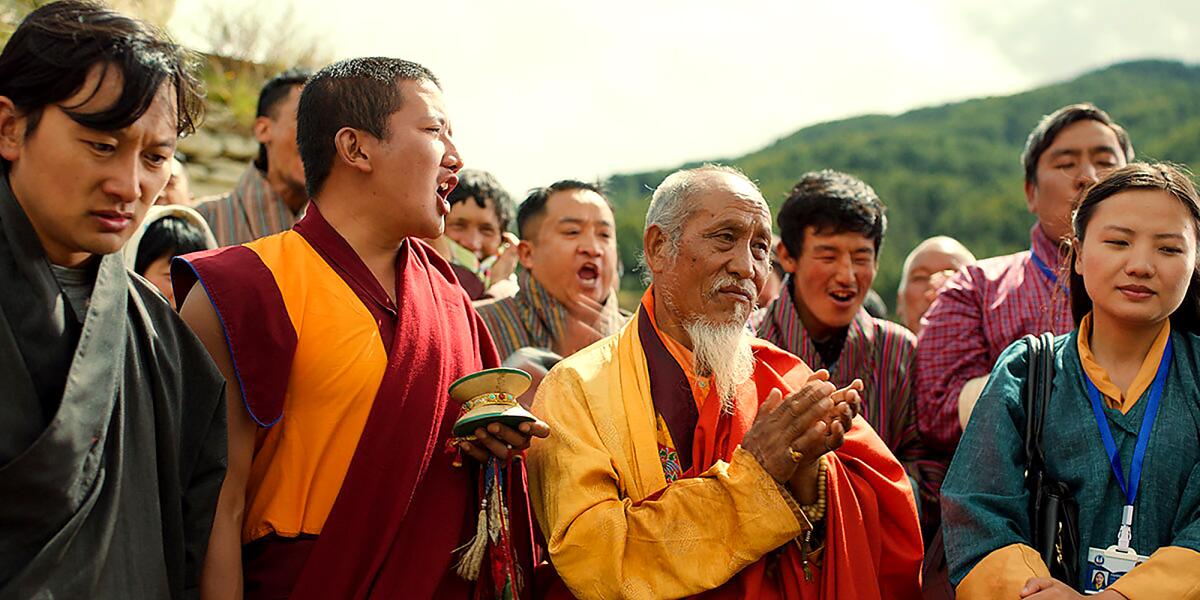Bhutan, Spain, Iceland: Why these Oscar entries for international film are worth a watch

- Share via
The 2023 contenders for the international film Oscar are filled with tales of real-life struggles from the Ukraine war (Ukraine’s “20 Days in Mariupol”), the Holocaust (United Kingdom’s “The Zone of Interest”) and the European migrant crisis (Italy’s “Io Capitano”). The following three contenders — from Spain, Bhutan and Iceland — fall into that category in many respects, as their stories unfold along distinct and stunning landscapes.

‘Society of the Snow’
Spaniard J.A. Bayona, the director and co-screenwriter of “Society of the Snow,” is well aware his film isn’t the first to tackle the harrowing experiences of the passengers of a 1972 Andes flight disaster. The tragedy stranded 33 survivors on a remote mountaintop. But the filmmaker and the people who lived through the experience knew that one side of the story still hadn’t been told.
“What was missing were the other ones, the ones that stayed in the mountain,” Bayona said. “The fact that we are giving the dead a voice in the story and put their sacrifice to the level of heroes we’ve been talking about all the time, I think that was very important. Not only for them but for all of us.”
This isn’t the first time Bayona has tackled a real-life disaster. In “The Impossible,” the 2014 film starring Naomi Watts, Ewan McGregor and Tom Holland, he chronicled a family’s horrors after a tsunami struck the coast of Thailand in 2004. Yet that experience can’t compare to the responsibility he felt with telling the story of the Andes survivors. He said he’s never been more scared to screen a finished movie for someone.
“It was the first time the families of the survivors and the survivors were in the same event with the families of the deceased. And they all know each other very well,” Bayona said. “They live in the same neighborhood, but most of them for 50 years haven’t talked about it. I have the impression that it was a healing experience, because, for the first time, the survivors were giving a voice to the dead, and by doing so, they were [giving a voice to] the anonymous heroes, the ones that the press didn’t talk that much about.”

‘The Monk and the Gun’
The 21st century has been monumental for Bhutan. After centuries of isolation, the South Asian nation opened its doors to the Western world by allowing television and access to the internet. In many ways, those cultural changes are the basis for Pawo Choyning Dorji’s “The Monk and the Gun,” centered on the country’s mock democratic elections in 2007.
“It is probably the only country in the world where democracy was gifted by its king to the people without a war, without a revolution, without the people calling for change,” Dorji said. “And when the king gifted them democracy, the people said, ‘No, we don’t want it. We want you to rule over us.’ And all that happened over such a short time period. And there was this immense change and transition that came in.”
Dorji, who was nominated in this category for the drama “Lunana: A Yak in the Classroom,” has embraced situational humor with his second film. “Monk” features intersecting storylines including that of an American antique collector on the hunt for a 19th century rifle, a young monk tasked by his lama to find a gun (in a nation that outlaws them), and frustrated election workers attempting to teach inhabitants in the remote parts of the country how to vote. Recollections from that last experience dramatically informed the film.
“They said that they felt very bad that they were teaching them how to campaign and how to debate,” Dorji said. “And then this old woman came to them, very, very emotional and said, ‘Why are you teaching us this? We are not confrontational. We are not rude.’ So back then, a lot of people were very nervous about it, because why fix something if it’s not broken?”
‘Godland’
Hlynur Pálmason was born and raised in Iceland. He then studied and lived in Denmark for 12 years before returning to his native country. Those experiences and the underlying tension between the residents of Iceland and its onetime ruler are at the dark heart of his gorgeous epic, “Godland.”
“I was interested in these two countries, because they do have history,” Pálmason said. “Iceland was under the Danish crown, and if you go a little bit back and you read letters or communications between these two countries, there’s a lot of conflicts, but it’s not blood-driven or anything like that. It’s more subtle, and I think I just wanted to understand it more and explore it.”
“Godland” follows an obstinate Lutheran priest sent to build a church in a small village on the remote island in the late 19th century. Instead of sailing around the island, he insists on landing on its eastern coastline and then traveling across dangerous terrain to get a better sense of his new home. This allows Pálmason to capture some staggering images of what appears to be a barren Icelandic landscape. Except it often wasn’t.
“You’re framing one shot, and then beside it there’s a huge electronic pole or something like that. And I think it’s harder probably every year to find places that aren’t spoiled,” Pálmason said. “But I live on the southeast coast of Iceland, so it’s quite isolated, so there’s a vast landscape around it, and it’s very easy to find a place where you’re alone. So, I decided very early on that if we were going to make this film, I wrote it for certain places, certain locations that I knew.”
More to Read
From the Oscars to the Emmys.
Get the Envelope newsletter for exclusive awards season coverage, behind-the-scenes stories from the Envelope podcast and columnist Glenn Whipp’s must-read analysis.
You may occasionally receive promotional content from the Los Angeles Times.






